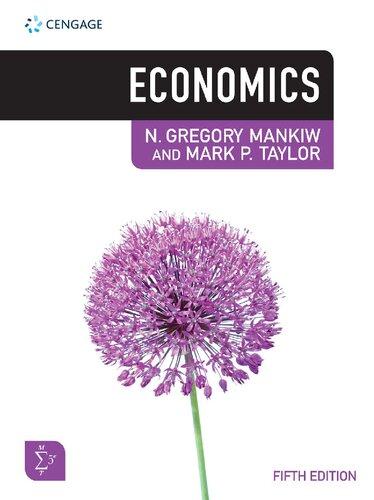The rallying cry of Donald Trump in the US presidential election in 2016 was to Make America
Question:
The rallying cry of Donald Trump in the US presidential election in 2016 was to ‘Make America Great Again’ and to focus on policies that protected and boosted US jobs and US workers. On election, Mr Trump imposed a range of tariffs on goods like steel and aluminium and in 2018 a spate of tariffs was imposed on a range of Chinese goods amid claims from the United States that China did not ‘play fair’ in international trade, a claim which China rejects.
The move towards an increase in protectionism led to fears that global trade would contract affecting the growth potential for many countries. In the United States, the imposition of tariffs had the support of many people who claimed that the benefits of free trade were far more illusory than economists might suggest. As has been noted in this chapter, there will inevitably be winners and losers in any issue relating to international trade. What is important to consider is who are the winners, who are the losers, what power does each have and what is the extent of the gains and losses they suffer?
If the United States imposes a 10 per cent or even a 25 per cent tariff on the import of rice from China, for example, economics tells us that the demand for rice in the United States will fall as its price rises. That reduces the quantity of imports into the United States. But consider users of rice; does this mean they will stop using and consuming rice in the same quantities as before the tariff or will they seek to buy rice from elsewhere? One option would be to switch to buying rice from US producers. Rice is produced in parts of the United States, primarily California, Texas, Mississippi, Missouri and Arkansas, but US rice production only accounts for a small percentage of global production. Global production of rice is around 480 million tonnes whereas total production in the United States is only around 13 million tonnes, about 2.7 per cent. It is unlikely, therefore, that consumers of rice in the United States can switch to buying domestically produced rice. Unless consumption of rice falls dramatically, it is likely that imports of rice from China, which has the tariff, would switch to imports of rice from other countries which do not have tariffs imposed on them.
Existing rice producers like Vietnam, Malaysia and India might be the countries to step in and take advantage of the trade dispute between the United States and China andexport their rice to the lucrative US market. Which of these countries is best placed to replace the Chinese exports of rice? That largely depends on how geared up producers are in the country to expand production and fill the gap left by China. That is not easy, and the institutional, legal and regulatory framework for business in each country will make it easier for some to respond than others. This in part is measured by what is call the ‘Ease of Doing Business Index’ (EoDBI). This index is compiled at the World Bank and is a measure of the legal, regulatory and institutional factors that exist in a country which influence the ease with which businesses can set up, operate and flourish.
In 2018, Malaysia was ranked 15th and classed as ‘very easy’, Vietnam came in at 69th classed as ‘easy’, and India was ranked 77th, classed as ‘medium’. The EoDBI generates its rankings based on 10 key factors which include the tax regime, registering property, enforcing contracts, accessing credit and electricity, and the process which must be followed to set up a business. If countries like India, for example, want to be a ‘winner’ out of the trade dispute between the United States and China, its government might find it wise to focus on improving the comparative advantage India has over rivals like Malaysia and Vietnam.
Critical Thinking Questions
1 ‘Protectionism is the only way in which a country can ensure that its own workers and jobs are secured from unfair competition from abroad.’ Unpick this statement using the theories outlined in this chapter and comment on the extent to which you agree with the view in the statement.
2 Why do you think that many economists are supporters of free trade? Why might non-economists consider the benefits of trade to be ‘illusory’?
3 Analyze the difference in the possible outcomes of a country imposing a tariff of 25 per cent on goods from one country to that of a similar tariff on imports of a good from a range of countries.
4 To what extent do you think the ease of doing business in a country can be a source of comparative advantage?
5 Assume that the United States imposes a tariff on rice exported by China. Analyze the economics of this decision taking into account different theories of international trade covered in this chapter.
Step by Step Answer:






